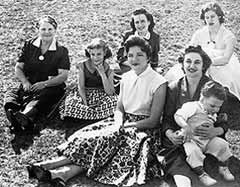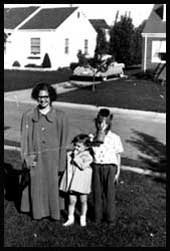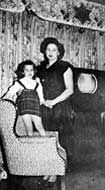|
 In 1952, my father borrowed his sister Ida's movie camera to film our car trip from Des Moines to California. From that moment until the mid-1960s, my father recorded nearly every major and minor event in our family's history. His home movies of my growing up gave me the chance to watch, reconstruct, and better understand myself and my family. In 1952, my father borrowed his sister Ida's movie camera to film our car trip from Des Moines to California. From that moment until the mid-1960s, my father recorded nearly every major and minor event in our family's history. His home movies of my growing up gave me the chance to watch, reconstruct, and better understand myself and my family.
When I decided to make a film that became Yidl in the Middle: Growing Up Jewish in Iowa,1 I knew I would use those home movies, which began in my early childhood, as the film's backbone. I watched the movie with many different audiences, including one at Barnard College, with my close friend and Barnard ('72) graduate, Ruth Bayard Smith, in attendance. Ruth and I mused about the similarities of our two families. We had both grown up in kosher homes. We went to Hebrew School through high school and were very active in Jewish youth groups. We were both daughters of "blue collar" Jews. Ruth's dad worked as a truck driver for the now-defunct Boston Traveler and then later for the Boston Globe. My father worked as a fireman. These twin pillars of strong Jewish and blue collar identities fascinated us. This is what we had hoped to develop further when we initially began to work on this essay. Unfortunately, we were unable to continue these conversations due to Ruth's illness. Given this, the narrative below reflects only some of the topics we discussed in relation to my film.
Sharing my film with Ruth invoked an awareness that we also shared a certain history: growing up Jewish in mid-twentieth-century America. This history was a gift. We were able to begin to talk about extended family, class and religious observance and how all of these factors shaped our notions of Jewishness.
When people see Yidl in the Middle, they are often surprised by the film's celebration of family life. But coming from Des Moines, Iowa, my Jewish identity focuses on family life. While only 3,000 of the city's 300,000 residents are Jewish, I was barely aware of my "minority" status. In my family, as many as 40 relatives would sit around the seder table. My celebration of family life was the only possible way to frame my story.
 | I am the middle child of five, born to parents who themselves had grown up in Des Moines. All five of my father's surviving siblings lived in Des Moines for most of my childhood. We all lived within a fifteen-minute drive of each other, even in traffic. At the very least, the whole Booth clan got together for all the major Jewish and American holidays, and a smaller group would eat Shabbos dinners together. Extended family members were our first line of defense. They were also our best friends. |
Family members also functioned as critics. Besides my parents, my paternal aunts and my grandmother Baube Ethel were a regular presence in my life. They would comment, like Marge's sisters on The Simpsons, about my appearance - my weight, my posture, my clothing and my refusal to wear make-up. Later they commented on my religious and political activities. They were critical and made their views known. Wasn't it perhaps too parochial of me to be so involved in my Jewish youth group? Wouldn't my work in voter registration take me into dangerous neighborhoods and my anti-Vietnam activism possibly end me up in jail, thus breaking the hearts of Baube and my parents? These weekly critiques had the effect, of course, of fueling my passions further. How could my aunts be so petty and self-protected? Why did they need to make crystal clear to me what line I should be towing?
One of my cousins, two grades ahead of me, had become not only a cheerleader but also the one girl chosen from our high school to model clothes for the biggest department store's "Teen Board." At that stage in my life, I was a bit zaftig.2 How could I compete with my cousin? I tried out twice for cheerleading - I had school spirit to spare but, apparently, did not look the part - and "Teen Board" was certainly not within my reach. Within the extended family, then, I played second fiddle to my cousin, though at home, away from her sisters-in-law's critiques, my mother made it clear that I did just fine.
The Jewish community of Des Moines was in many ways a larger version of my extended family. My synagogue, where men and women sat together and most people drove to shul, was Orthodox and like my second home. There were two other active synagogues, Conservative and Reform, and nearly every Jew in town belonged to one of them. You had to. Though there had been a thriving Jewish Community Center (JCC) from the 1920s to the 1940s, by the time I came along, the JCC was hardly used by Jews. After World War II, most of Des Moines' Jews moved west, and the JCC became a hubbub of African American activity. In the 1960s, when my father-in-law was head of Des Moines' Jewish Welfare Federation, there was talk of building a new JCC. But leaders of the Jewish community wanted to downplay their identity and appear more "normal." "Couldn't we just call it 'community center,' and leave the Jewish part out?" one seriously asked. So the idea died. Instead, a basketball court and locker room got added to the Orthodox shul's new building. Thereafter, Jewish life got confined to the synagogues. It neatly resembled the Christian world around us.
Jews in Des Moines knew each other, at least by sight if not by name. This closeness was a mixed blessing. We spoke in one voice, especially if the issues were Israel or anti-Semitism. But, far from public view, there were strong synagogue rivalries that underscored differences in class and self-presentation. The Reform Jews, many of them civic leaders, looked to me like their gentile counterparts. Judaism was, I imagined, not a topic of discussion for them. My father, Des Moines' only Jewish fireman, also looked like his gentile co-workers, but being Jewish was part of his daily banter. My father seemed much more Jewish to me than the Reform Jews seemed - he used Yiddish words, he davenned3 at shul, he referred to himself as a Jew in public. Reform Jews were much more assimilated than that.
The first Jews to settle in Des Moines had been German Reform Jews and their success by assimilation set the tone for all of us. "Don't make waves, don't rock the boat," was - and is - the Des Moines Jewish mantra. My aunts' concern with my behavior and appearance had everything to do with towing that line. It was not just that I might embarrass Baube and my folks; I also risked bringing shame on my extended family and the whole Jewish community. I had it in my power to behave or to become a shandah4 for the goyim5, a scandal in front of the non-Jews. So I grew up feeling, we all did, that the acceptance and well being of all Des Moines' Jews were in our hands. God forbid I should be caught wearing jeans downtown.
Why does he want to get even? My father feels that some powerful Reform Jews turned their backs on him when they could have helped him advance within the ranks of the Des Moines Fire Department after he scored high on Civil Service exams but got passed over for promotion because he was a Jew. "It'll look bad if I stick my neck out for another Jew," one prominent Jewish attorney told him as he explains in the film. So my father waited year after year for a Civil Service promotion that came only at the last possible moment. Years of waiting made him feel betrayed. Only at home was my father able to fight back with the one weapon he had - denigration for Reform Jews' accommodationist form of worship and life. I could have left my father's characterization of Reform Jews out of the film. Its inclusion, though, encapsulates not only a personal slight but also a history of caste and class in a small Jewish community. It suggests strong inner-group tensions and conflicting ideas about loyalty, assimilation, ethnic belonging and pride. It is the kind of story you get primarily at the dinner table.
My perspective in Yidl in the Middle comes not only from sitting at the dinner table but also from understanding that important familial truths lie in conversations around the dinner table. In the film, those conversations appear frequently within the context of Iowa Jewish history. The view my parents want the public to see is one of their children's accomplishments, similar to the mother in the memoir The Color of Water who also fiercely fought for her children's success as a Jewish mother of Black children. But it is the unguarded moments, like my family's dinner table conversations, that provide the keys to understanding any family. Honors and degrees may be one mark of family values, but those symbols can block the way to a richer story. The essence of a family's culture lies in the intangibles of the family table - the thoughts and shorthand expressions, the fights, the laughter and tears, and even the silences. We reveal our intimate and our Jewish selves not only through acts of public observance but also through private social moments.
Ironically, the family dimension of Yidl in the Middle went entirely unnoticed when the film screened in Des Moines. Some leaders in the Des Moines Jewish community - who scheduled a gala premiere of the film and then, four months later, cancelled the screening - objected to my critical look at the position of Jews in Des Moines. They had wanted the film to portray the Des Moines Jewish community as "positive and upbeat." Instead, my focus on country club exclusion, Jewish in-fighting, the conundrum of Iowa's anti-Semitism, and most importantly, the Des Moines Jewish imperative to not "make waves" or "rock the boat," seemed controversial, sufficient grounds for cancellation. These Des Moines Jewish leaders had labored during my childhood - and their successors do so today - to keep the word "Jew" as far away as possible from controversy.
Though they speak out against anti-Semitism, something they did not do in the 1950s and 1960s, these Jewish leaders still avoid saying anything that might possibly be perceived as critical of non-Jews, including country club exclusion that took place 40 years ago. To mention that painful history now, in their view, is to open up old wounds and to suggest that Des Moines' Jews are not content. Critically examining the past, they argue, might be seen as complaining, thus undermining Jews' current acceptability.
So when The Des Moines Register printed a front-page "Opinion Section" column entitled, "Film About Growing Up Jewish in Des Moines Stirs Controversy," the leaders of the Jewish community were outraged. Some broadcast their fear that the column and my film would foment anti-Semitism.
But this did not happen. Instead, when Yidl in the Middle ultimately did screen, first at the Conservative synagogue in Des Moines - the site designated for the original, cancelled screening - then at Drake University in Des Moines, and, finally, on Iowa Public Television, non-Jews were quick to come forward with interest and gratitude. I was invited to be a speaker about tolerance and diversity on several Iowa college campuses. Non-Jews, it turned out, were eager to learn more about Jewish life than the rudiments of ritual and theology usually offered up by the Jewish community. They were interested in seeing how Jews lived and thought. The intimacy of Yidl in the Middle's familial perspective and first-person narration gave them the opening they had been seeking for discussing their own lives and attitudes about difference. Wonderful conversations followed these screenings. These conversations were of a type long envisioned by Des Moines' Jews whose fears of being perceived as "ungrateful" prevented them from having the conversation they most wanted.
In my working-class family, the dinner table is where we express ourselves most freely. My parents continue to feel that other people with degrees, including their children, are more articulate than they are. They value their children's "cultured sounding" English and often take pride in deferring to us to express things for them. We are, in some ways, their trophy children. For my father, the cancellation of Yidl in the Middle by the Jewish powers-that-be in Des Moines painfully echoed those same powers' refusal to come to his aid with the fire department. Both his reaction and the cancellation itself - a reflection of fear by leaders in the Jewish community of "airing dirty laundry in public," as one Grande Dame put it - re-enacted in many ways the issues illuminated in the film. Though the film made my father something of a cult figure - he relished being recognized at his California JCC gym - my father and the Des Moines Jewish leaders were locked in Des Moines Jews' past struggles to "not offend the goyim."
 I had hoped that Yidl in the Middle would move beyond old Jewish community fears to spark a discussion about difference. Remarkably the film has generated powerful and moving discussions by Jews and gentiles alike on identity, difference, and our difficulties in finding a vocabulary to speak about those topics. Building community out of difference - going back to the dinner table - is not so easy. But finding a way to talk about it is surely an important beginning. It seems that in many ways we all perceive ourselves as different, we are all one type or another of "Yidl in the middle." The trick is in figuring out how to move and grow with that in mind. I had hoped that Yidl in the Middle would move beyond old Jewish community fears to spark a discussion about difference. Remarkably the film has generated powerful and moving discussions by Jews and gentiles alike on identity, difference, and our difficulties in finding a vocabulary to speak about those topics. Building community out of difference - going back to the dinner table - is not so easy. But finding a way to talk about it is surely an important beginning. It seems that in many ways we all perceive ourselves as different, we are all one type or another of "Yidl in the middle." The trick is in figuring out how to move and grow with that in mind.
Endnotes
1. "Yidl" means "little Jew," as in the title of the Yiddish-language classic "Yidl Mitn Fiddle."
2. Heavy.
3. Pray.
4. Scandal.
5. Non-Jew.
|